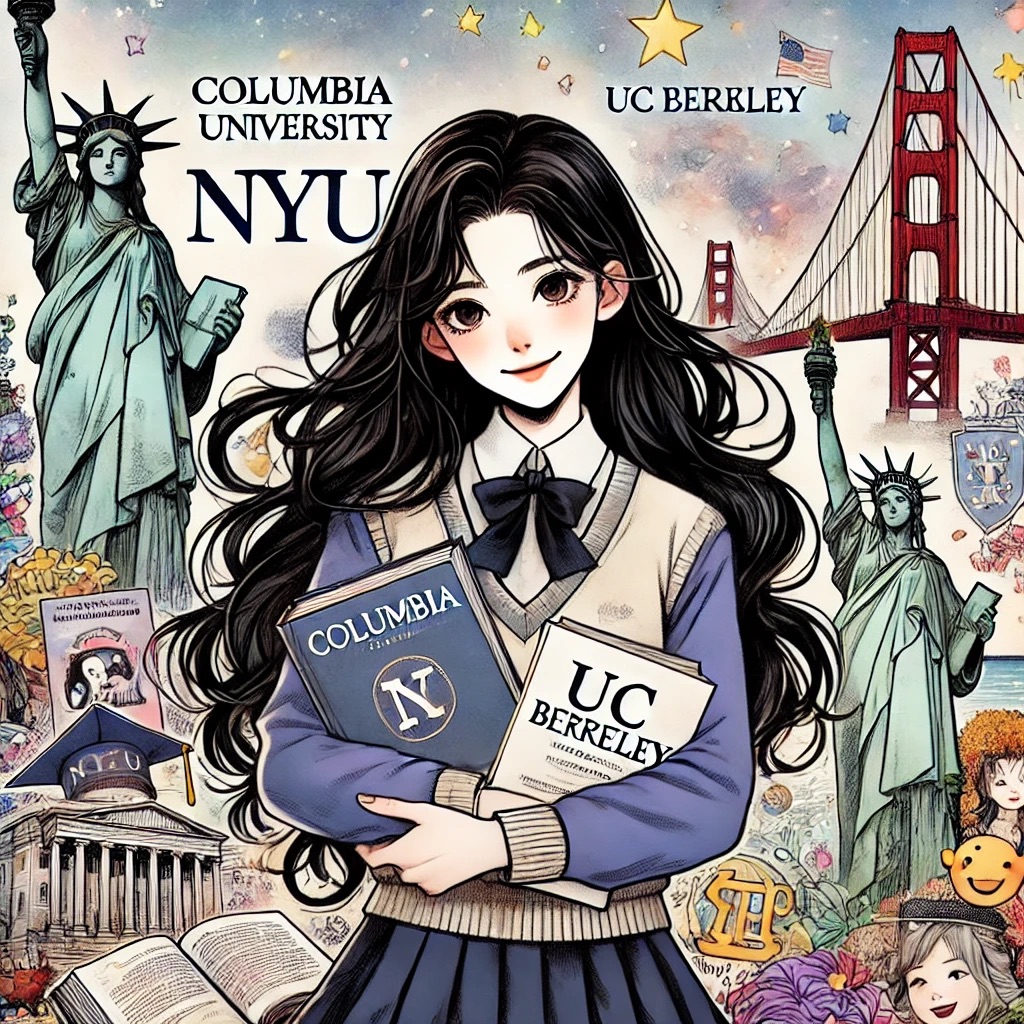아이비리그 합격 케이스 스터디: “동화책을 출판한 스토리텔러의 힘”
GPA 3.5, SAT 1420으로도 아이비리그 합격이 가능할까? 실제로 동화책 출판과 스토리텔링 능력으로 Columbia, NYU, UC Berkeley에 합격한 한국 국제학교 여학생의 케이스를 분석합니다.

1. 학생 기본 프로필
- 이름: H.K. (한국 국제학교 여학생)
- GPA: 3.5 (학교 평균 수준, 일부 과목에서 B+)
- SAT: 1420 (Math 720 / Reading & Writing 700)
- AP: Calculus BC 3점, English Literature 4점, Psychology 4점
- 주요 활동
- 고등학교 2학년, 직접 영어 동화책 출판 (ISBN 발급 & 온라인 판매)
- 국제학교 문예지 Editor 활동 (Creative Writing 부문 담당)
- 지역 아동센터 봉사: 동화 낭독 & 글쓰기 워크숍 운영
- Debate Club 참여 (임원직은 없지만 스토리텔링 능력으로 주목)
- 추천서: 문학적 상상력과 공감 능력 강조
2. 성적의 약점과 보완 전략
📉 약점: GPA 3.5, AP Calculus BC 3점 → 상위권 대학 평균보다 낮음
📈 보완:
- 점수 대신 스토리텔링 역량 + 출판 경험 강조
- Holistic Review에서 중요하게 여기는 창의성·사회적 영향력 부각
- “점수가 아닌 글로 세상과 연결되는 힘”이라는 스토리텔링으로 차별화
3. Application Essay 핵심 포인트
- 할머니의 전래동화 기억 → 상상력의 출발점
- 국제학교에서의 소외 경험 → 동화로 타인과 연결
- 출판 과정에서의 시행착오 → 끈기와 성장
- 출판 후 아동센터 봉사와 확산 → 사회적 기여로 확장
👉 결론: “제 글은 단순한 이야기가 아니라, 사람을 연결하고 새로운 관점을 열어주는 다리입니다.”
Common App Essay
When I was seven, my grandmother told me a tale about a sparrow with a broken wing. She sat on the floor cushion in her small apartment in Seoul, the smell of barley tea drifting through the room, her hands folded neatly in her lap. The sparrow could not fly, she explained, so it discovered another kind of freedom—singing. I remember tracing the faint scars on her fingers while listening, convinced that stories could mend things that looked beyond repair.
Years later, I found myself in an international school classroom where every conversation was in English, not Korean. The sparrow no longer seemed to belong. My GPA settled somewhere in the middle, and calculus assignments felt like climbing cliffs without a rope. At a school where students measured each other by exam scores, trophies, or university acceptance lists, I often felt half-finished, invisible. But even then, I clung to one certainty: I loved stories, whether they were whispered by my grandmother or scribbled in my notebook margins.
At first, I wrote in secret. I filled spiral pages with dragons that wore crooked crowns and children who found secret doors in laundry rooms. In ninth grade, though, I began reading some of these stories aloud to children at a nearby community center. One boy, who rarely spoke above a whisper, asked if the dragon in my tale could have glasses like his. I rewrote the ending so that the dragon peered through thick, round frames. The boy laughed, and for the first time that semester, I felt seen.
That small request turned into a larger calling. I spent months polishing a manuscript of fairy tales. Publishers rejected me again and again—emails that began with “unfortunately” and ended with silence. One editor admitted, “Your writing is imaginative but uneven.” For weeks I considered giving up. My AP Calculus BC exam score had come back as a three, a reminder that persistence had its limits. But I thought of the boy with the dragon’s glasses, and I revised line after line with him in mind. Eventually, a small local press agreed to publish the collection. Holding the slim book with an ISBN stamped on the back felt less like personal victory and more like proof that words could leave my hands and land in someone else’s.
The book led to weekend workshops at the same community center. We stapled construction paper into blank picture books and let the kids fill them with whatever worlds they dreamed up. One girl drew a fox that wanted to be a scientist; another boy wrote about a tree that learned to dance. Their pride reminded me that storytelling was never about polished perfection. It was about participation—an invitation to imagine out loud.
Teachers at school began to notice, too. My English teacher encouraged me to become an editor for the literary magazine. Editing the work of classmates taught me to listen carefully, not only to words but to intentions. My GPA did not suddenly transform, yet I understood that education was more than transcripts. It was also about impact—the small ways my writing connected with people who needed it.
Universities often ask: Why should we choose you? My answer is that I carry stories. Stories that comfort, stories that connect, stories that open hidden doors for others. Just as the sparrow in my grandmother’s tale found its freedom in song, I found mine in writing. In college, I hope to combine literature with psychology to study how narrative shapes empathy and resilience. I want to continue writing for children but also explore how stories can strengthen communities across cultures.
I am not the student with flawless transcripts or perfect scores. I am the student who believes in the power of stories—because they can give a sparrow its wings back, hand a dragon its glasses, and remind a quiet child that their voice matters.
4. 합격을 이끈 Differentiator
- 실제 출판 경험 – ISBN 등록 & 판매 → 실행력 입증
- 사회적 확장성 – 동화책을 봉사 활동과 연결 → 교육적 가치 창출
- 추천서와 에세이의 시너지 – “She turns words into bridges.” → 대학이 원하는 이미지 강화

5. 최종 합격 결과
- 아이비리그: Columbia University (Creative Writing)
- 사립 명문: NYU Gallatin, Tufts University
- 주립 명문: UC Berkeley, University of Michigan
👉 성적은 다소 부족했으나, “출판 + 사회적 임팩트 + 스토리텔링” 조합으로 Holistic Review에서 강력한 인상을 남겨 합격.

6. 시사점: 우리에게 주는 교훈
- 완벽한 점수가 아니어도 합격 가능 – 강력한 차별화 포인트가 있다면 충분히 경쟁력 확보
- 활동은 나열이 아니라 스토리 – 하나의 내러티브로 엮을 때 설득력 강화
- 대학은 진정성을 본다 – 점수보다 호기심, 영향력, 성장 서사를 중시
